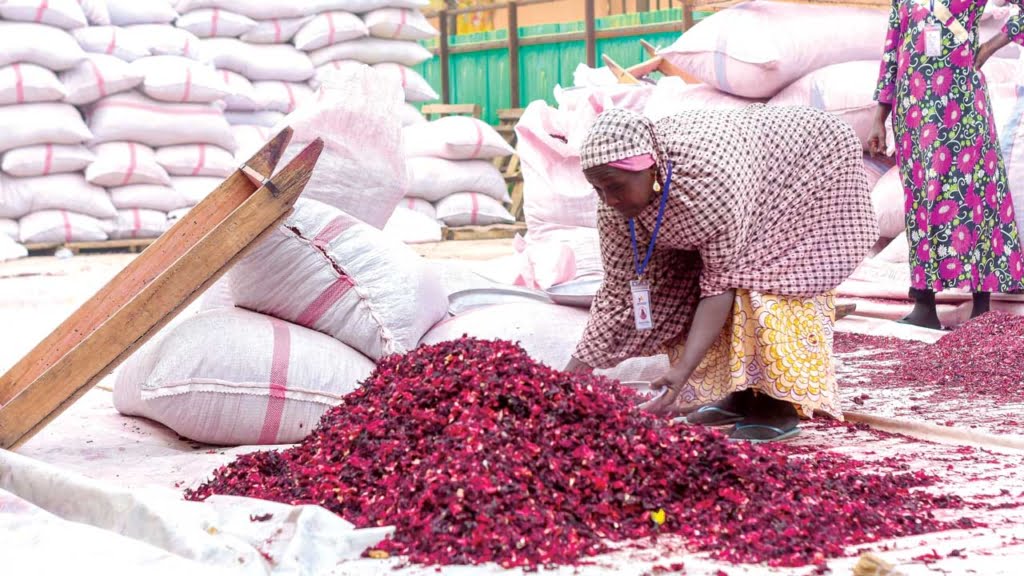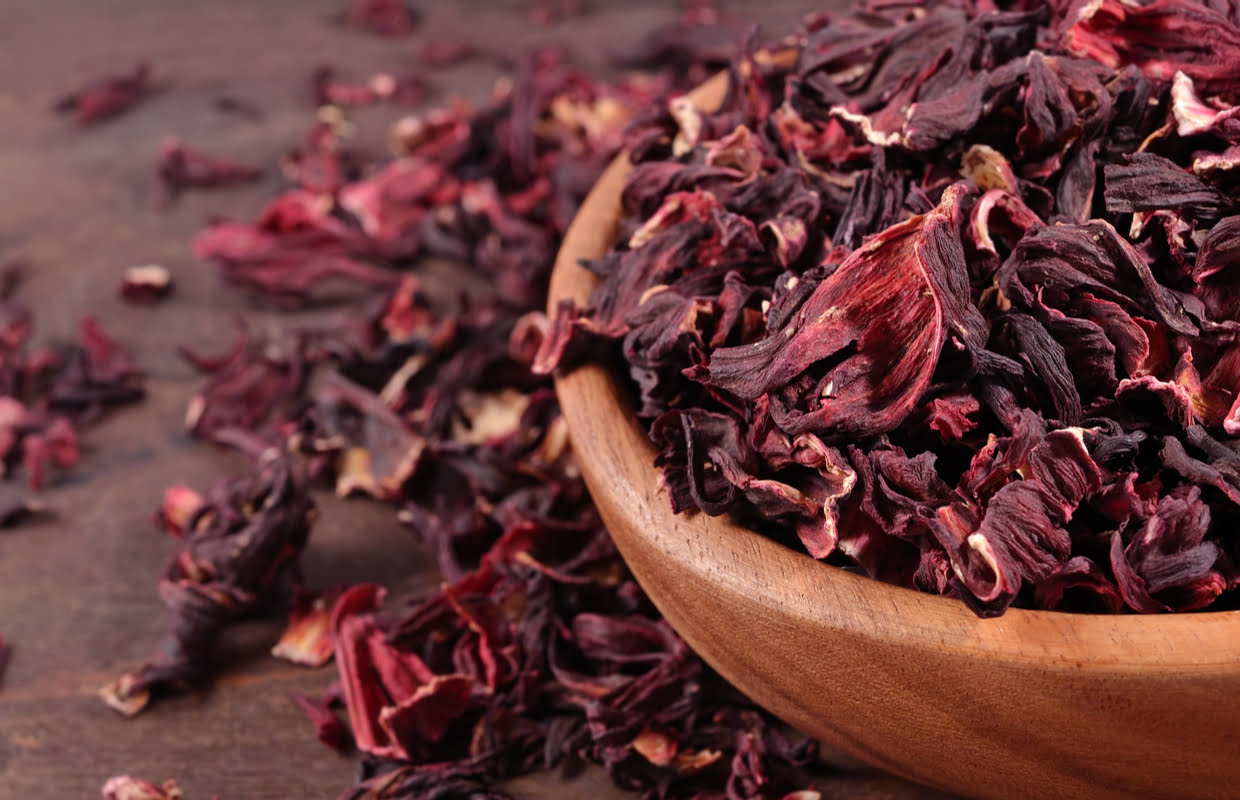The vibrant red petals of dried hibiscus have not only brightened beverages worldwide but also established themselves as valuable commodities in international trade. Known for its high levels of antioxidants and unique tart flavor, dried hibiscus is in demand globally, both for its culinary uses and health benefits. Nigeria has become a leading producer, with companies like Ajigo Farms Ltd playing a significant role in the export of dried hibiscus. This article explores the dynamics of the global trade of dried hibiscus, identifies major exporters and importers, and discusses the factors driving its demand worldwide.
Understanding the Demand for Dried Hibiscus
Dried hibiscus is prized for its versatility. Known primarily for its use in teas and beverages, the product has various other applications, including cosmetics, herbal medicines, and food colorants. Its appeal lies in its rich nutritional profile, as hibiscus is high in vitamins, antioxidants, and anti-inflammatory properties. The demand has surged as consumers around the world continue to seek natural, healthy ingredients, with the hibiscus flower perfectly fitting into this growing trend.
Key Exporters of Dried Hibiscus
Several countries contribute significantly to the global supply of dried hibiscus, with Nigeria being one of the leading producers. Other major exporters include Egypt, Sudan, and Mexico. Each of these countries offers unique varieties of hibiscus, tailored to meet the preferences of diverse global markets.
- Nigeria: As one of the largest producers, Nigeria plays a central role in the dried hibiscus trade. Its climate and fertile lands provide ideal growing conditions, resulting in high-quality yields. Nigerian companies, particularly Ajigo Farms Ltd, have established a reputation for quality, reliability, and efficiency, exporting large quantities of dried hibiscus to various international markets. Ajigo Farms Ltd, with its commitment to sustainable farming and high standards, has gained recognition as one of the leading exporters, meeting demands from Europe, the Americas, and Asia.
- Egypt: Known for producing dark red hibiscus, Egypt is another significant exporter, especially to the Middle East and Europe. Egyptian hibiscus is recognized for its deep color and potent flavor, highly valued in both culinary and medicinal markets.
- Sudan: Sudan exports large quantities of dried hibiscus, mainly to the Middle East and Asia. The country’s hibiscus is prized for its rich color and robust taste, commonly used in teas and medicinal preparations.
- Mexico: Although relatively smaller in scale, Mexico is a notable player in the hibiscus market, catering primarily to North and South American buyers. Mexican hibiscus is often used in traditional dishes and beverages, adding a unique flavor and color.
Leading Importers of Dried Hibiscus
The international market for dried hibiscus has seen considerable growth over the past few years, especially in regions where hibiscus-based products are popular. The key importing countries include:
- United States: The United States is one of the largest importers of dried hibiscus, driven by the popularity of hibiscus tea and its increasing use in functional foods and health products. U.S. companies source hibiscus from major suppliers like Nigeria, Egypt, and Sudan, incorporating it into a range of beverages and supplements.
- Germany: As a hub for herbal and natural health products, Germany imports significant quantities of dried hibiscus, primarily from African countries. Germany’s demand is fueled by the growing trend of herbal teas and natural wellness products, with hibiscus tea becoming particularly popular.
- France: France, another large consumer, integrates hibiscus into various culinary and cosmetic products. French companies rely on imports from Egypt and Nigeria, where the hibiscus meets the high standards required for food and cosmetic applications.
- Middle Eastern Countries: Countries like Saudi Arabia and the UAE are also prominent importers, due to hibiscus’ popularity as a refreshing beverage and its traditional role in herbal medicine. These regions often source hibiscus from Sudan and Egypt.
- Japan: Known for its robust health-conscious market, Japan has become a growing importer of dried hibiscus. The Japanese market favors hibiscus for its health benefits, and companies in Japan use it extensively in teas and skincare products.

Factors Shaping the Dried Hibiscus Trade
Several factors influence the global trade of dried hibiscus, with changing consumer preferences and sustainable sourcing practices playing significant roles.
- Health and Wellness Trends: The demand for hibiscus products has risen sharply as health-conscious consumers seek out natural, plant-based ingredients. Hibiscus’s antioxidant properties and rich vitamin content make it particularly appealing.
- Flavor Preferences: The tart, cranberry-like flavor of hibiscus appeals to a broad spectrum of consumers. Many beverage companies in the U.S., Europe, and Asia are blending hibiscus with other natural flavors, broadening its appeal and stimulating demand.
- Sustainability Concerns: Sustainable farming practices are becoming increasingly important in the agricultural sector, and buyers are prioritizing suppliers who emphasize environmentally friendly production methods. Leading exporters like Ajigo Farms Ltd have embraced these practices, ensuring they meet international sustainability standards.
- Trade Agreements and Policies: Trade agreements between hibiscus-exporting countries and major importers have positively impacted the ease of trading. Reduced tariffs and streamlined import-export processes encourage smoother trade flows, benefitting exporters and importers alike.
Ajigo Farms Ltd: A Leading Exporter from Nigeria
Ajigo Farms Ltd has emerged as a significant player in the hibiscus trade, positioning itself as one of Nigeria’s foremost exporters. Known for its commitment to quality, the company has established a reputation for exporting premium-grade dried hibiscus that meets the high standards of international markets. By adopting sustainable farming methods and investing in quality control, Ajigo Farms Ltd has gained the trust of global buyers, who value consistent product quality and reliable supply chains.
The Future of the Global Hibiscus Trade
As health-conscious consumption continues to rise, the global market for dried hibiscus is expected to grow, with increasing demand in both developed and emerging markets. This growth presents opportunities for exporters in Nigeria and other hibiscus-producing countries, paving the way for further expansion into untapped markets. With companies like Ajigo Farms Ltd setting the benchmark for quality and sustainability, the future of the hibiscus trade looks promising, poised to cater to the world’s growing interest in natural and healthful products.
In summary, the global trade of dried hibiscus thrives due to its versatility, health benefits, and adaptability to a range of cultural preferences. With leading exporters like Nigeria’s Ajigo Farms Ltd at the forefront, the hibiscus trade is set to expand further, connecting farmers and consumers across the globe through this vibrant and valuable flower.
Ajigofarms is a reliable global agricultural purchase sourcing with profound expertise in the manufacturing, and exportation of food crops. We are tested, and trusted suppliers of all kinds of cash crops and food crops. Our constant supply chain solution makes exporting easy, quick, and safe, we are identified with timeliness and meeting up with deadlines. Regardless of the region you are located in worldwide, you can reliably order your Agric products and be rest assured of successful delivery.




